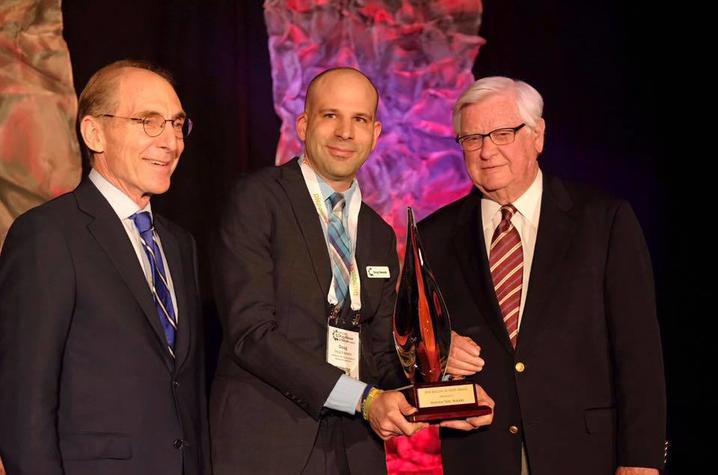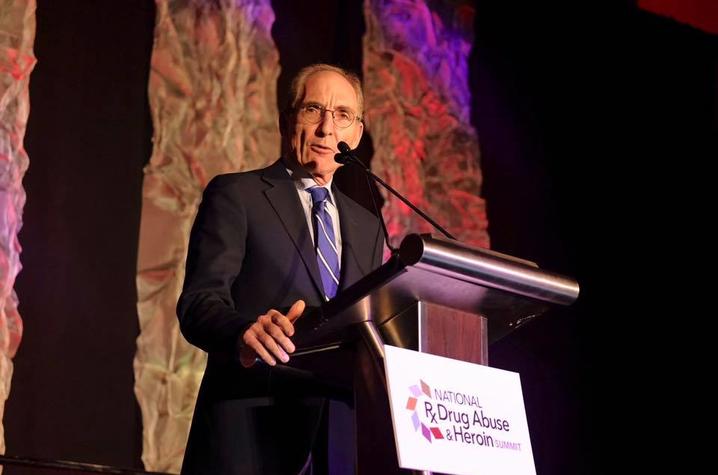UK President, Researchers Participate in Annual RX Drug Abuse and Heroin Summit in Atlanta
LEXINGTON, Ky. (April 22, 2019) — University of Kentucky administrators and researchers will join officials from local, state and federal agencies, as well as leaders from business, academia, and communities across the country impacted by prescription drug abuse this week in Atlanta for the 2019 RX Drug Abuse and Heroin Summit. This year, to underscore the significant attention being paid by all levels of government to this devastating public health epidemic, President Donald J. Trump and First Lady Melania Trump will address attendees.
The Summit began in 2012 under the leadership of U.S. Rep. Harold “Hal” Rogers (KY-5th) and Operation UNITE (Unlawful Narcotics Investigations, Treatment and Education, Inc.), a collaborative model striving to prevent abuse of drugs and facilitate recovery by creating strategic partnerships, providing leadership, promoting education, coordinating treatment, and supporting law enforcement in a 32-county region in southern and Eastern Kentucky.
"The leadership of Congressman Rogers has been instrumental in efforts to combat the opioid epidemic in Kentucky and across the nation. The scourge of opioid addiction is far-reaching, and his support has helped position the university to lead in research and discovery to address the issue," said UK President Eli Capilouto who is attending the Summit for the fourth year.
Today, as it has been in the past, the Summit is the annual gathering place for stakeholders to discuss what’s working in prevention and treatment. Other featured speakers during the weeklong event include Dr. Francis S. Collins, director of the NIH, Dr. Robert Redfield, director of the Centers for Disease Control and Prevention, Dr. Elinore F. McCance-Katz, assistant secretary for Mental Health and Substance Use, Dr. Nora Volkow, director of NIDA and Admiral Charles W. Ray, deputy commandant for Operations U.S. Coast Guard.
“The opioid epidemic is far-reaching and multi-faceted, leaving a void in each family and community it scars. Kentucky families, and communities throughout the region, know the devastation and havoc of addiction and that’s why this Summit and this gathering of ideas and experts and national leaders is such an important gathering for us to participate and be in engaged in as citizens of the Commonwealth and as representatives of Kentucky's flagship university,” Capilouto said.
UK faculty sharing their research as part of this year's summit include:
Svetla Slavova, associate professor in the UK College of Public Health; and from the UK College of Pharmacy: Trish Freeman, associate professor; Jeffery Talbert, professor and director of the Institute for Pharmaceutical Outcomes and Policy (IPOP); and Chris Delcher, assistant professor and associate director of IPOP. The group will discuss specific changes to Kentucky law, potential impacts to patient care, and the expanded use of prescription data for public health surveillance.
In 2017, Kentucky became the first state to schedule gabapentin as a controlled substance. This was a result of concerns among Kentucky pharmacists for gabapentin misuse and the high percentage of Kentucky drug overdose decedents who tested positive for gabapentin. Talbert will present data on gabapentin prescribing variations among demographic groups and geographical regions in the state.
Freeman will present the results of a federally-funded study that evaluates prescriber and pharmacists’ perceptions of a 2017 state law that required drug-conviction data be made available when a healthcare provider searches for a patient's prescription history. As a result, Kentucky became the first state to make criminal conviction data available during an episode of clinical care. The unintended consequences of this change are unknown.
Delcher will discuss the potential unintended consequences for inappropriately identifying cancer patients as "doctor shoppers" using prescription data, while Slavova will examine newly developed measures for "high-risk" opioid analgesic prescribing that enhanced the state’s analytical capability to identify areas and populations at high-risk for overdose and to guide policy and program evaluation.
Also presenting are: Mandy Binkley, nurse navigator at the UK Center on Drug and Alcohol Research; Dr. Roger Humphries, professor of emergency medicine in the UK College of Medicine; Dr. Michelle Lofwall, medical director, Robert Straus Clinic and First Bridge Clinic at the Center on Drug and Alcohol Research; Dr. John Thomas Murphy, professor of anesthesiology at the UK College of Medicine; and Sharon Walsh, professor of Behavioral Science, Psychiatry, Pharmacology and Pharmaceutical Sciences, in the colleges of medicine and pharmacy.
This team will present, "Bridge to Life: Connecting Individuals Presenting to the Hospital with Complications from Opioid Use Disorder to Evidence-based Care" about their findings involving individuals suffering from opioid use disorder (OUD) who experience life-threatening medical conditions as a result of their drug use and injecting behavior, including overdose, endocarditis, osteomyelitis, and other infections.
The presentation will share the experience of launching the First Bridge Clinic, an easily accessed service for patients to initiate immediate evidence-based care for OUD. This new initiative arose from a partnership between UK HealthCare and state government partners, and capitalizes on Substance Abuse and Mental Health Services Administration (SAMHSA) support dedicated to the expansion of services.
Researchers and clinicians will discuss their roles, along with the challenges, barriers, and successes experienced to date. In the first year of operation, over 300 individuals were referred for treatment with over one-third initiating care at The First Bridge.






